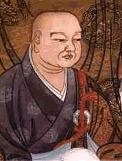
Back كيزان (راهب بوذى من اليابان) ARZ Keizan Jōkin German Keizan Esperanto Keizan Jōkin French Keizan Hungarian Keizan Jōkin Italian 瑩山紹瑾 Japanese Keizan Jōkin Polish Keizan Portuguese Oánh Sơn Thiệu Cẩn Vietnamese
Keizan Jōkin Zenji | |
|---|---|
 | |
| Title | Zen Master Daishi |
| Personal | |
| Born | Keizan Jōkin 1268 |
| Died | 1325 (aged 56–57) Japan |
| Religion | Zen Buddhism |
| School | Sōtō |
| Other names | Taiso Jōsai Daishi |
| Senior posting | |
| Predecessor | Tettsū Gikai |
| Successor | Meihō Sotetsu |
Students
| |
| Part of a series on |
| Zen Buddhism |
|---|
 |
Keizan Jōkin (Japanese: 瑩山紹瑾, 1268–1325), also known as Taiso Jōsai Daishi,[1][self-published source] is considered to be the second great founder of the Sōtō school of Zen in Japan. While Dōgen, as founder of Japanese Sōtō, is known as Highest Ancestor (高祖, kōso), Keizan is often referred to as Great Ancestor (太祖, taiso).[2]
Keizan and his disciples are credited with beginning the spread of Sōtō Zen throughout Japan, away from the cloistered monastic practice characteristic of Dōgen's Eihei-ji and towards a more popular religion that appealed to all levels of Japanese society. Keizan founded several temples during his lifetime, most notably Yōkō-ji and Daihonzan Sōji-ji (founded on the Noto Peninsula and moved to Tsurumi-ku, Yokohama in 1911). Today Sōji-ji and Eihei-ji stand together as the two principal Sōtō Zen training centers in Japan.
- ^ Pussel, Ryofu (2010). A Critical Analysis of the Buddhist 88-Temple Pilgrimage on Shikoku Island. Xlibris. p. 39. ISBN 978-1-4535-3665-0.
- ^ Heine, Steven (2008). Zen Skin, Zen Marrow: Will the Real Zen Buddhism Please Stand Up?. Oxford University Press. p. 88. ISBN 978-0-19-532677-2.
© MMXXIII Rich X Search. We shall prevail. All rights reserved. Rich X Search